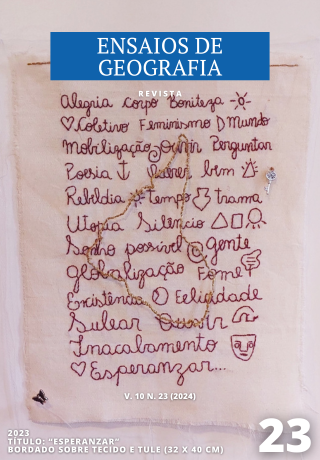UN Security Council Simulation Methodology in Basic Education
an interdisciplinary experience report in light of BNCC
DOI:
https://doi.org/10.22409/eg.v10i23.61934Keywords:
Basic Education, UN Simulation, Teacher Training, Interdisciplinarity, BNCCAbstract
This work consists of disseminating and reporting the interdisciplinary project Simulation of the UN Security Council, with the guidelines of the National Common Curricular Base (BNCC), developed in a formal Basic Education institution with a 9th year class of Elementary School (Escola Fundação Darcy Vargas), and the related challenges to the preparation and production of a propose between Geography, Portuguese Language and Citizenship and Social Responsibility. To this end, a bibliographical and a experiential discussion are made on teacher training - and continuing - and basic education, as a necessary space for research and dialogue, following the precepts of Paulo Freire (1996) and Maurice Tardif (2002), since the objective of the project is not only to develop the skills and competencies of the BNCC, but also the great focus on reinforcing citizenship training. Therefore, we want to help teachers who wish to construct an activity in this format from a previous and real experience. The main results are in the educational and pedagogical training of students and in the paid teaching appreciation that the responsible teachers achieve, which contributes to a construction aligned with the improvement of a curriculum that, in fact, is interdisciplinary and liberating.
Downloads
References
BRASIL. Base Nacional Comum Curricular. Ministério da Educação. 2017. 600p.
CAVALCANTI, L. S. Geografia, Escola e construção do conhecimento. Campis: Papirus, 2001. 196p.
DOCUMENTOS, PUC-Minas - MiniONU, 2019. Disponível em: https://www.pucminas.br/minionu/Paginas/docs.aspx. Acesso em: 20 fev. 2024.
FREIRE, P. Pedagogia da autonomia: saberes necessários à prática educativa. São Paulo: Ed. Paz e Terra, 1996. 148p.
hooks, b. Ensinando a transgredir: educação como prática de liberdade. São Paulo: Editora
WMF Martins Fontes, 2017. 283p.
LOPES, C. S. Aprendizagem da docência em Geografia: reflexões sobre a construção da profissionalidade/Teachers’ training in Geography: the construction of the professionality. Ensino em Re-Vista, [S. l.], 2012. p. 307-320. Disponível em: https://seer.ufu.br/index.php/emrevista/article/view/14938. Acesso em: 12 fev. 2024.
MODELO DPO, Simulação Geopolítica do Ifes – SiGI, 2019. Disponível em: https://sigi.ifes.edu.br/vii/public/assets/docs/modelo-dpo.pdf. Acesso: 20 fev. 2024.
MODELO PADRÃO PARA O “DOCUMENTO DE POSIÇÃO OFICIAL” OU DPO. CMA-MiniONU, 2018. Disponível em: https://cmaminionu2018.wordpress.com/2018/10/04/modelo-padrao-para-o-documento-de-posicao-oficial-ou-dpo/. Acesso em: 20 fev. 2024.
ONU Brasil. Mensagem do secretário-geral das Nações Unidas para o Modelo ONU. Youtube, 15 de junho de 2022. Disponível em: https://youtu.be/GcWU0be4iw4?si=vsnEKtz5D3gVhTJL. Acesso em: 21 de fev. 2024. 1min55s.
SANTOS, A. F.; MORAIS, A. V. P.; AGUIAR, A. R. A simulação das organizações internacionais na Geografia Escolar: contextos e experiências sobre a prática no chão da sala. Caminhos de Geografia, Uberlândia, v. 23, n. 90, p. 335–350, 2022. Disponível em: https://seer.ufu.br/index.php/caminhosdegeografia/article/view/61424. Acesso em: 12 fev. 2024.
SANTOS, V. M. Coesão referencial e ensino: histórico, aplicações e propostas. 142p. Dissertação (Mestrado em Linguística e Língua Portuguesa) – Faculdade de Ciências e Letras, Universidade Estadual Paulista. São Paulo, 2011.
SAVIANI, D. História das ideias pedagógicas no Brasil - 6a edição. Campinas, SP: Autores associados, 2021 (Coleção memória da educação), 488 p.
TARDIF, M. Saberes Docentes e Formação Profissional. Petrópolis, RJ: Vozes, 2002. 325p.
VALENTE, J. A.; ALMEIDA, M. E. B.; GERALDINI, A. F. S. Metodologias ativas: das concepções às práticas em distintos níveis de ensino. Rev. Diálogo Educ., Curitiba, v. 17, n. 52, p. 455-478, abril. 2017. Disponível em http://educa.fcc.org.br/scielo.php?script=sci_arttext&pid=S1981-416X2017000200455&lng=pt&nrm=iso. Acesso em: 12 fev. 2024.
VARGAS, K. Reflexões sobre o Ensino de Geografia no Ensino Fundamental II: A aprendizagem do conceito de território através da Simulação da ONU. In: VII Congresso Brasileiro de Geógrafos, 2014, Vitória. Anais do VII CGB. Vitória: AGB, 2014. p. 1-11.
ZALUSKI, F. C; OLIVEIRA, T. D. METODOLOGIAS ATIVAS. In: CIET:EnPED, São Carlos, maio 2018. ISSN 2316-8722. Disponível em: https://cietenped.ufscar.br/submissao/index.php/2018/article/view/556. Acesso em: 01 mai. 2024.
Published
How to Cite
Issue
Section
License
Copyright (c) 2024 Da Revista (Ensaios de Geografia) e do Autor

This work is licensed under a Creative Commons Attribution 4.0 International License.
CC BY Attribution. Others may distribute, remix, transform, and build upon the material for any purpose, even commercially, provided they give the author and licensor the credits.


